Will We End Up Like The Dinosaurs?
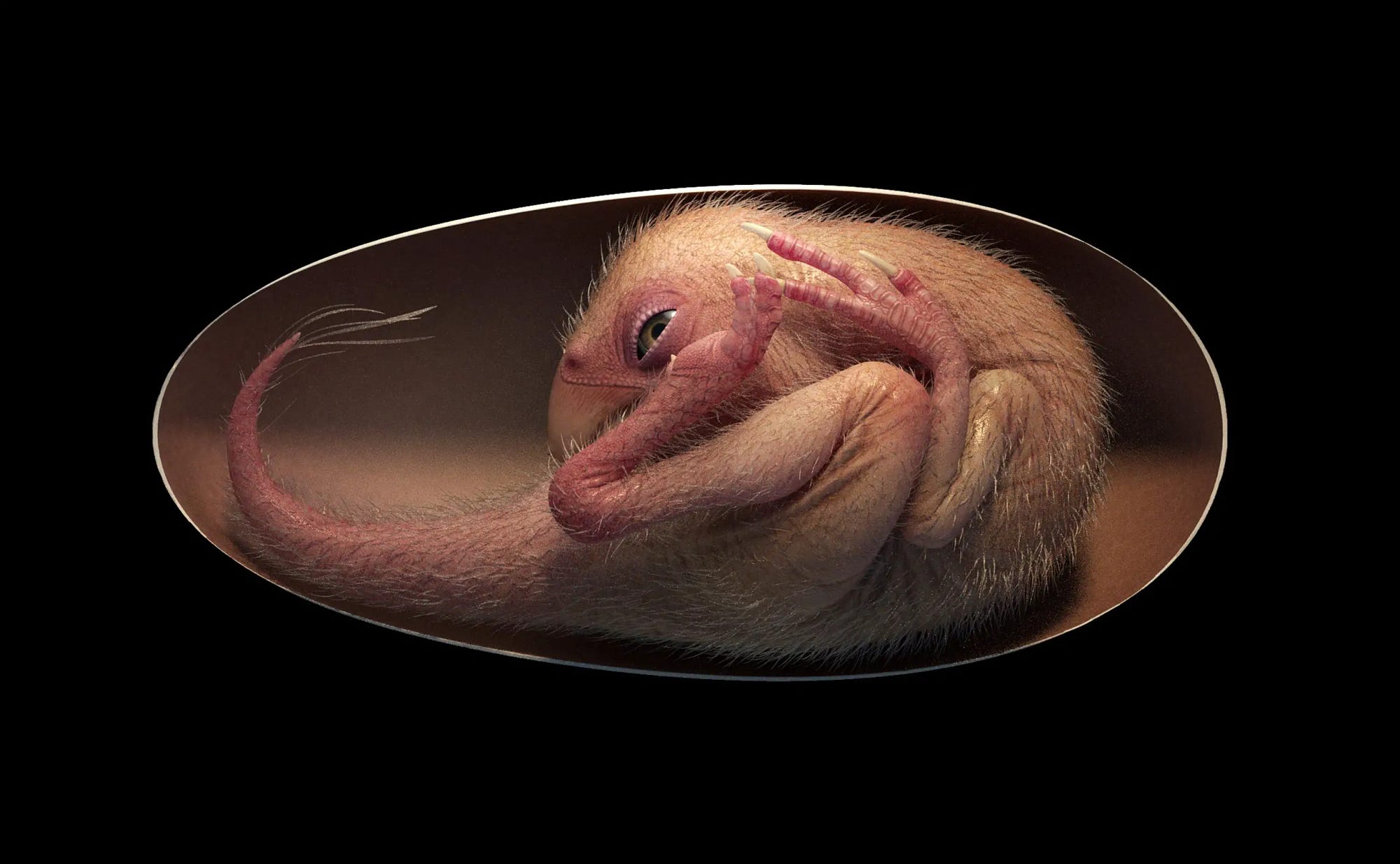
Will we end up like the dinosaurs? We should be so lucky. The dinosaurs actually survived much worse than us. They were dealing with climate change and got hit by an asteroid and somehow made it through. In paleontological fact, dinosaurs never went extinct at all. Birds are dinosaurs, and they’re pretty badass too.
Mammals have been evolving with dinosaurs for millions of years and it’s only in the past few centuries that ‘we’ could claim any sort of dominance. If you could call killing our own damn selves dominance. Behold what we have done to our class (Mammalia):
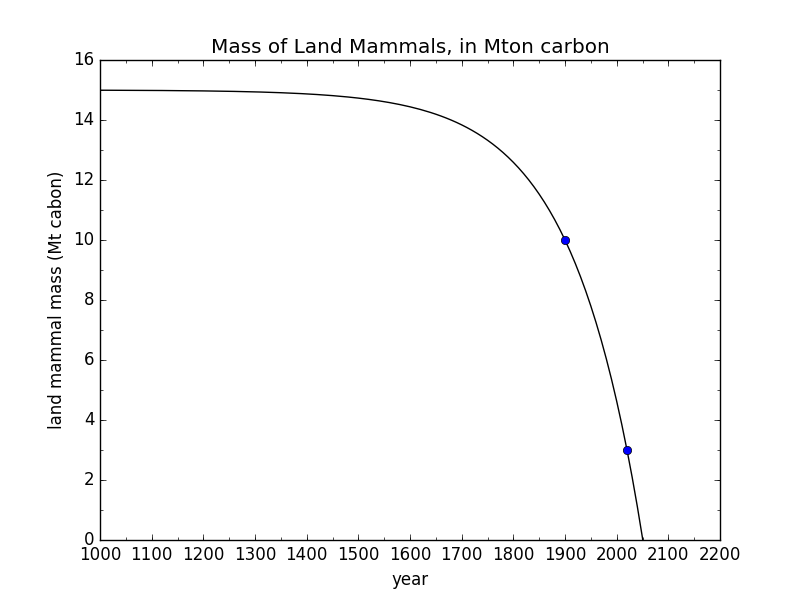
Geologically speaking we look like total dumbasses. We have no place looking down on dinosaurs. They survived much longer than us, and also didn’t crash into themselves. For all we know, they’ll be picking our bones. Our vaunted civilization is just another mass extinction event the dinosaurs are living through. We’d be wise to learn from them how we ourselves can expect to straggle through.
The Mistaken Extinction
When the book The Mistaken Extinction was published in 1997 the idea that dinosaurs never went extinct was controversial. This idea is broadly accepted now, though popular language still lags behind. As paleontologist Julia Clarke says, “birds are living dinosaurs, just as we are mammals.”
The common idea that dinosaurs died and mammals took over after the K/T event (☄) isn’t true. Both lines survived, and it’s only recently that chickens have become a joke. Dinosaur species outnumbered and still outnumber mammals now. In popular language what we mean is that the cool dinosaurs died out, but that isn’t even true. For much of homo-history, birds looked like ‘mini’ T-Rex’s with beaks. Absolutely terrifying.
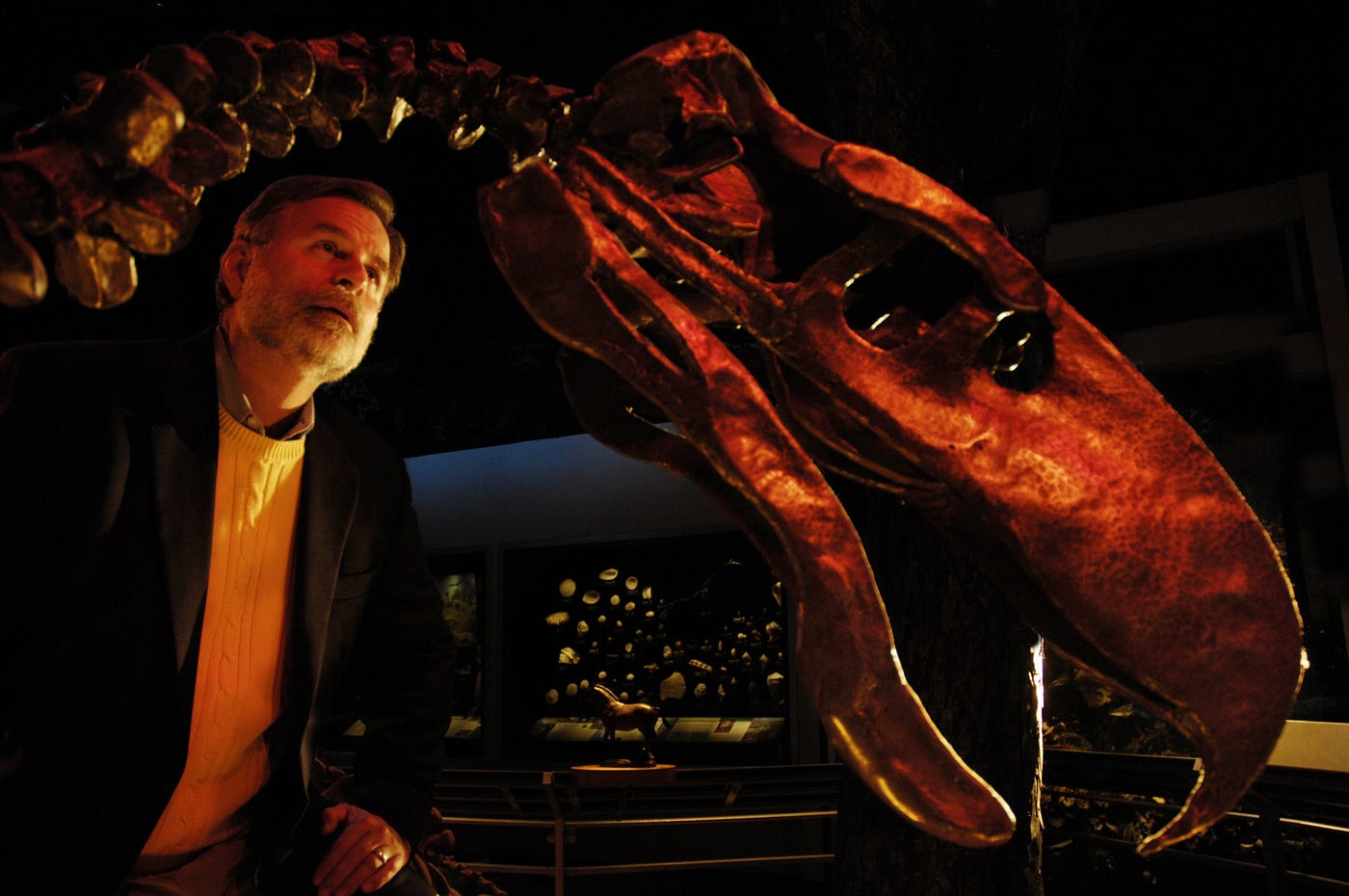
The giant ‘Terror Birds’ of just a few hundred thousand years ago are not a categorical departure from Tyrannosaurus and they were bigger than the Velociraptors that made me jump when watching Jurassic Park.
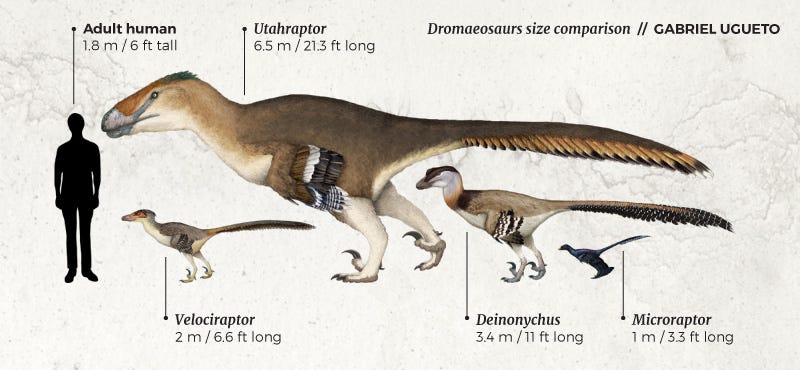
The small, scavengy dinosaurs that took over after ‘terrible lizards’ became ‘terror birds’ soon enough. They were certainly smaller, but everyone else was smaller too. Would you want to fuck with a 7-foot bird that could crack your skull like a nut? These dinosaurs were certainly big enough to get the job done, which was scaring the shit out of ancestral mammals.
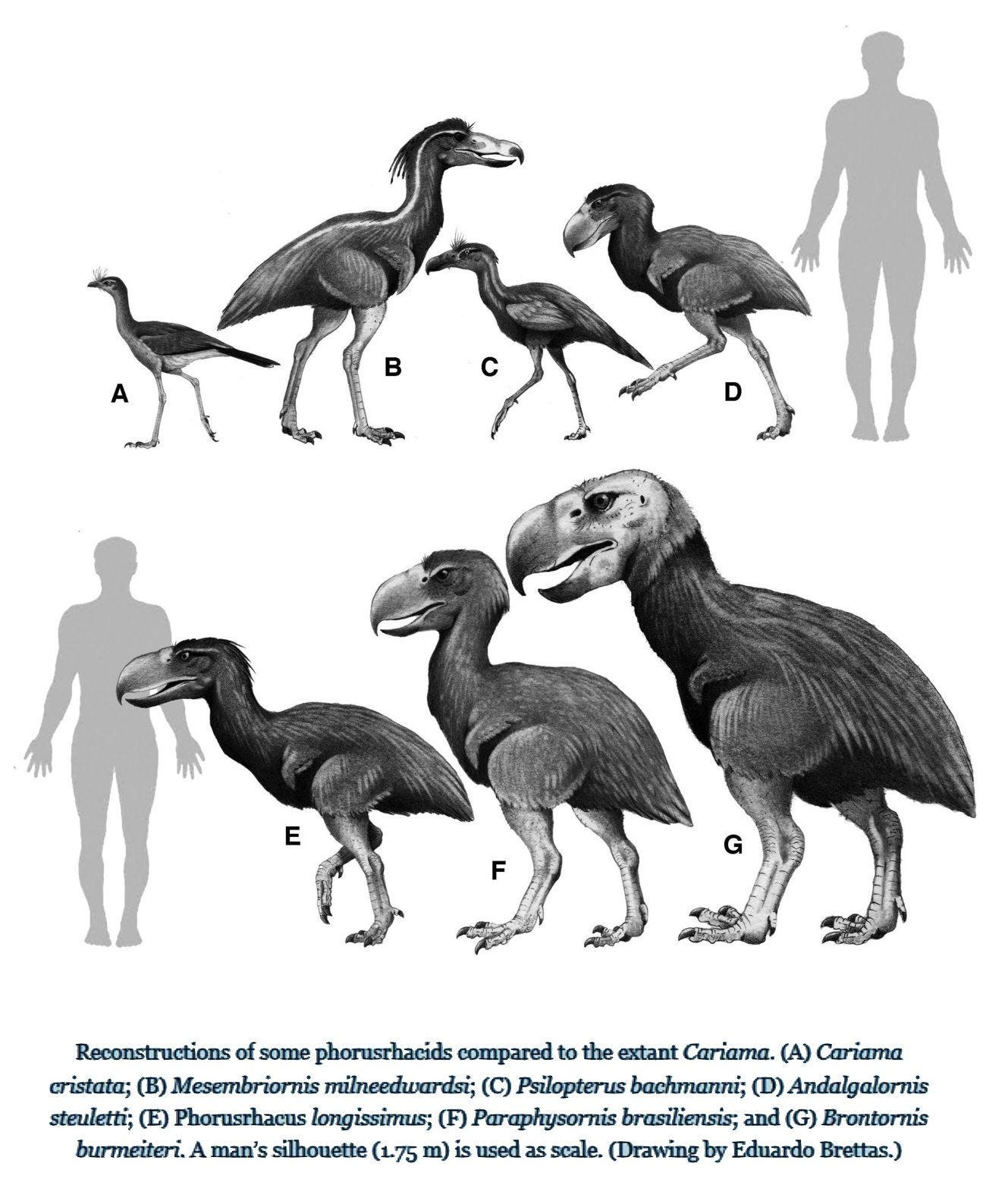
When hominids emerged, we were lucky to isolated in Africa, away from these OG apex predators, until we figured out sticks and stones. Yet we were walking the Earth at the same time, that is known. As Dingus and Rowe said,
Possibly the most meaningful lesson gleaned from mapping dinosaur phylogeny is that our own history has overlapped with dinosaurs for about 20,000 generations, depending on what you choose to call a human.
And as they continued:
Looking at the history of the entire dinosaur lineage, it is a myth that theropods surrendered their role as top predator at the end of the Cretaceous, at least in some parts of the world. In South America and elsewhere, giant predatory theropod birds dominated terrestrial faunas for millions of years after the K/T boundary. Today, feathered raptors remain at the top of the food chain in many parts of the world, having inherited the role from some of their Mesozoic relatives. In many ways, the post-Cretaceous history of avian dinosaurs is a continuation of what took place in the Mesozoic.
Yet today we casually say ‘dinosaurs went extinct’, or ‘non-avian dinosaurs’, if we’re being fancy. But what does that even mean? The biggest, most awesome mammals are also extinct, but we don’t dump that on the whole group. Why discriminate against dinosaurs?
Terror birds were undoubtably big enough to fit the popular definition of badass dinosaur. Hell, an avian dinosaur (an eagle) just grabbed our village cat last month. It’s hard to say that mammals are top of the food chain where I’m from, or at most points in human history. While dinosaurs definitely got smaller after their climate got wrecked, they continued to go hard until now. They did not ‘go home’. Even today you can fuck around with a cassowary and find out. Those dudes are terrifying.
As Dingus and Rowe say,
If current phylogenetic maps are correct, it appears that dinosaurs and our own primate lineage co-existed for a time span exceeding 70 million years. Both lineages survived whatever happened at the end of the Cretaceous. They further withstood the Pleistocene wave of extinction that surged across the globe. But following in its wake have come second and third waves, the second engulfing tropical islands [colonization] and the third now moving across the continents [capitalism/globalization].
Both of the Holocene waves have cascaded from the tragic symmetry between human population growth and the loss of biological diversity. The third wave of extinction has yet to reach its crest, and it probably won’t until after human population growth has peaked and begun to decline. By current estimates this is still a century away.
Note the second part of this quote. While we destroyed the big and more dinosaury flightless birds with colonization (guns, pigs, rats), we are now destroying everything with global capitalism (Colonialism 2.0). Dinosaurs, having survived multiple extinction events and are now living through a third one. Thus the question is really not ‘will we end up like the dinosaurs’ but ‘where will we end up with them.’ And in that sense we have a lot to learn from our fine feathered friends. Most notably humility. This is notably hard for humans, who claim ‘higher’ intelligence and look down on dinosaurs and all other creatures, despite all proof to the contrary.
Our Dumbass Evolution
In the pre-Darwinian age, history was divided neatly into ages (according to Dingus and Rowe). There was a neat progression from the Age of Fishes to the Age of Reptiles (Dinosaurs) and then to an Age of Mammals. A nice linear progress, saving the best for last. It’s important to remember that dinosaur bones entered the jaws of science before the idea of evolution, and many people argued that dinosaurs were created and destroyed. As D&R write:
In the same paper in which Richard Owen coined their name [Dinosauria], he also claimed that dinosaurs are extinct, in an effort to disprove the idea of evolution. But with so much evidence linking birds and dinosaurs, why have so many evolutionists, from Huxley to Ostrom, agreed that dinosaurs are extinct?
The belief that dinosaurs are extinct is one of the great ironies of paleontology. Richard Owen is sometimes reviled for fighting throughout his life against evolution. Yet, even though modern science recognizes Darwin as the victor in this battle, the world did not go on to adopt a Darwinian view of dinosaurs. If Owen is looking down from the Hereafter, he must be gratified despite the bad press. Most people still accept his anti-evolutionary view, that dinosaurs are extinct.
Of course the actual fossil record makes a mockery of this. There are no distinct ages, and dominance is really just a timing difference. Mammals were around with the dinosaurs and dinosaurs never left their ‘Age’ was through. For all we know, there could be a great flood coming and it’ll The Age Of The Fishes, Part Deux. Evolution has no concept of ‘progress’, it’s all about adaptation to the environment, and that environment is constantly changing. Evolution gives a fuck about your feelings of superiority, which is all ‘progress’ really is.
This is what even modern ‘believers’ in evolution miss. Evolution is not a straight line leading from dumb dinosaurs to intelligent humans to AI. Progress is not a evolutionary concept. There is only adaptation, and the environment is always changing underfoot. Often violently.
Modern humans believe that intelligence lets us cheat all this. The idea is that intelligence is a meta-adaption, the ability to adapt much faster than biology allows, using technology. Interesting idea, but the proof is in the pudding. After centuries of applied ‘intelligence’, the pudding is on fire. Forrest Gump said, “stupid is as stupid does” and we look like fucking idiots.
Humans have used what we call ‘intelligence’ to become spectacularly maladaptive, taking a giant steaming dump where we eat and calling it hot chocolate. Hideous amounts of our intelligence is devoted to pretending that eviscerating our ecosystem isn’t a problem because ‘economics’.
The aspirationally named Homo sapiens have used our ‘intelligence’ primarily for self-deception, namely the deception that we have a self at all. What we call ‘intelligence’ is really cultivated ignorance, pretending that individual humans are the most important thing in the world, and that there are no physical limits on our ambitions. The adults in charge are dumber than children, who instinctively understand that animals are kin and that we shouldn’t hurt them. We are dumber than cats who clean up their own messes and who are not, as you may have noticed, remotely impressed with us.
It is unclear whether intelligence is a trait any more notable than the horny frill on a Triceratops. Very impressive to that species, but nobody else seems to give a fuck, beyond trying to stay away from it. We say that human ‘intelligence’ is great for problem-solving, but what have we actually done with it? Create the mother of all problems.
Intelligence is supposed to be the ability to better understand and adapt, and this is precisely the opposite of what we have done. We have incarnated our greed as corporations and used technology not to adapt to the environment but to blindly devour it. We have anointed economists as sages and they don’t account for the environment at all. They treat the environment as an infinite void to grow into and dump our waste into, which makes us dumber than bacteria. They figured that lesson out 2.5 billion years ago. Forget dinosaurs, we are dumber than pond scum.
Our vainglorious understanding of history is that dinosaurs tried brawn against nature and failed, whereas humans tried brains and will win. This vanity is going in the bonfire now. The proof is in the pudding, and the pudding is on fucking fire. We didn’t even need an asteroid to top ourselves, just pure dumbassery.
Who Survived?
Given that dinosaurs are our living elders and measurably less stupid than us, what can we learn from them?
If you look at the day the asteroid hit, certain creatures survived and some didn’t. As Riley Black writes in The Last Days of The Dinosaurs:
Dinosaurs had evolved to match their habitat, and until now, Earth had changed slowly enough to let them adapt as needed. But this was too much for anything other than a bacterial extremophile to withstand. Caught out in the open — with no underground refuge or other shelter — most non-avian dinosaurs died within hours of the asteroid strike, no matter how near or far they were from the impact point.
Besides the impact, hot shrapnel turned the air into a 260℃ oven, earthquakes wracked the Earth, tsunamis lashed the shores, and fires that broke out everywhere. It was truly apocalyptic and anyone out in the open got roasted, right before they froze. All the dust the asteroid threw up blocked out the sun, causing temperature shifts of 15℃ downwards, which was actually helped by volcanoes dumping tons of CO₂ to heat the place up a bit. Needless to say, these conditions were not survivable by most, but some made it. So what can we learn about them?
Riley Black (above) said that creatures that could shelter — ideally underground or underwater — were able to survive the first day of impact. Smaller, scavengy creatures were able to weather the cold months to follow. The paleontologist Steve Brusatte said much the same thing in his book, The Rise And Fall of Dinosaurs.
The first thing we have to realize is that, although some species did survive the immediate hellfire of the impact and the longer-term climate upheaval, most did not. It’s estimated that some 70 percent of species went extinct. That includes a whole lot of amphibians and reptiles and probably the majority of mammals and birds, so it’s not simply “dinosaurs died, mammals and birds survived,” the line often parroted in textbooks and television documentaries. If not for a few good genes or a few strokes of good luck, our mammalian ancestors might have gone the way of the dinosaurs, and I wouldn’t be here typing this book.
Hence the first thing to disabuse ourselves of is the idea that mammals survived and dinosaurs did not. A lot of mammals died, and a lot of dinosaurs didn’t. The question is really what did that have in common. As Brusatte goes on:
There are some things, however, that do seem to distinguish the victims from the survivors. The mammals that lived on were generally smaller than the ones that perished, and they had more omnivorous diets. It seems that being able to scurry around, hide in burrows, and eat a whole variety of different foods was advantageous during the madness of the postimpact world…
The critters at the base of their food chain ate decaying plants and other organic matter, not trees, shrubs, and flowers, so their food webs would not have collapsed when photosynthesis was shut down and plants started to die. In fact, plant decay would have just given them much more food.
What Brusatte and Black say is that, broadly, being large and highly specialized (however awesome you were) became a distinct disadvantage during catastrophic times. The dinosaurs that did survive were what we call birds, and not the Terror Birds they evolved into millions of years later. These would have been smaller birds, able to fly to shelter, raise young quickly, or live off seeds and stuff that would survive the long winter after the literally hellish summer. The meek inherited the Earth so to speak, meaning the small and scavengy. That contains a lesson for us.
Another important lesson from the K/T extinction is a sense of geological time. How long recovery from catastrophe takes. So far humans are budgeting zero time for recovery, which is wildly optimistic. As Brusatte said, it took 500,000 years for things to get back to any kind of ‘normal’ at the beginning of the Tertiary Age.
Already, a mere five hundred thousand years after the most destructive day in the history of Earth, ecosystems had recovered. The temperature was neither nuclear-winter cold nor greenhouse hot. Forests of conifers, gingkos, and an ever-increasing diversity of flowering plants once again towered into the sky. Primitive cousins of ducks and loons loitered near the lakeside, while turtles paddled offshore, oblivious to the crocodiles lurking underneath. But the tyrannosaurs and sauropods and duckbills were no more, replaced by the sudden bounty of mammals that exploded in diversity when presented with an opportunity they had been craving for hundreds of millions of years: a wide open playing field, free of dinosaurs.
As you see, even Brusatte uses the modern concept of dinosaurs, mentioning birds in one sentence and then excluding them from their heritage in another. So does Black, the delusion is so deep that it’s even in the title of their books. We’ll ignore that and get to the point. What can we learn from the suffering of our living elders? What does this all mean, for us?
Who Will Survive?
The climate collapse we face is both slower and less catastrophic than what the dinosaurs were literally hit with. That leads to a few predictions. The first is that humans as a whole are as unlikely to go completely extinct. Like dinosaurs, we’ve expanded into lots of (technologically assisted) niches, at least some of which should still exist (along with the tools we’d need). Like dinosaurs there are lots of us, and it takes less than 2,000 specimens (historically) to completely restart. Humans are thus unlikely to go completely extinct, especially since we face far less challenges than the dinosaurs. Not being extinct’, however, is a distinctly reduced ambition than what we have now, which is that we’re going to ‘beat climate change’ and go fuck up Mars. This is completely out.
The clue from the K/T extinction event is that we will survive, just in a highly-reduced form. In the dinosaur ‘extinction’, it’s notable that the large and complex forms that died off. So that’s what we should be looking to lose. With humans, however, looks are deceptive. We look like regular apes but we have actually incarnated our greet into globe-spanning corporations, what I call artificial lifeforms. Evolutionarily, this is nothing new. Evolution started with cells joining other cells in early ‘murders and acquisitions’ (Bateman, 1991) and life taking ‘artificial’ form would not be surprising. Life is always emerging in ways that seemed impossible before, especially to the older lifeforms getting smoked out.
This artificial lifeform, the corporation, is our greed incarnated into a brain-eating, zombie corpse, devouring the world since the 1600s. It is really these artificial lifeforms that ate the big birds with colonialism, raped the planet with capitalism, and which are causing the collapse now. Regular humans are just the rats underfoot, trying to live off their droppings and avoid being squished.
Today, our ambitions have animated avatars far bigger than the dinosaurs and all of those burdensome beasts— the nation states, the cities, the corporations, the factories, the planes, the automobiles —should, historically speaking, be the most vulnerable. Large, complex creatures are the least adaptable to rapid change, and the large, complex society we’ve built is highly fragile. The ecosystem that artificial beings live in (‘the economy’) is big and unwieldy and — like the big dinosaurs — prone to dying in catastrophe.
Unfortunately for us rats, climate change is not a swift blow to the head like an asteroid. All the big beasts won’t just drop dead overnight. They’ll continue stomping and devouring us rat racers for at least another 50 years before collapsing under their own weight. And they may just kill all of us and leave a few server farms humming in the wasteland.
Corporations are so powerful and tenacious that artificial life may survive after most of the natural has died. Along with humans, the corporate form has expanded into every possible niche and also requires very few ‘shareholders’ to survive. It has the same advantages as us with literally limited liability. Corporations can literally kill us as long as they throw a few traitorous shareholders imaginary tokens. That’s what’s happening and it could continue well past the point I’d consider impossible. We’re kinda in uncharted territory here. The future is where predictions go to die. Survival is a crap shoot, involving more luck than logic.
The only thing we can say for sure is that unfucking a climate takes time. 500,000 years was considered fast for the dinosaurs. Before that, photosynthetic bacteria (pond scum) took millions of years to rebalance the climate. These are blinks in evolutionary time, but 500,000 years would be 25,000 generations for us. Which we simply are not accounting for.
Today, ‘intelligent’ people talk about ‘decarbonizing’ and ‘capturing carbon’, as if the only problem with a planet-consuming zombie is its bad breath. A problem, certainly, but the general premise is existentially bad. Given that our very conception of ‘intelligence’ seems to preclude humility, we will have to learn as Icarus did, by just crashing and weeping over the bones.
As I’ve discussed, ‘beating’ climate change is hopeless. It’s too late, and the very idea of controlling nature is what got us into this mess. The philosophical shift is probably more like Isaac Asimov’s idea of ‘The Foundation’, preserving knowledge for the long-rebuilding, while abandoning imperial ambitions for dead. Or Noah’s Ark, if you want to get biblical.
In this view, ‘saving the world’ looks more like dropping seeds for future scavengers than building electric dinosaurs with TVs in the back. It looks more like natural humility than artificial intelligence. It looks more like buckling down for dramatically reduced circumstances than buckling up in our brand-new Teslas and playing video games. But try telling that to Icarus. He’s high as fuck right now.
Where Will We End Up?
The answer to ‘will we end up like the dinosaurs’ is actually ‘inshallah’. God willing, what a blessing, truly a thing to pray for. The dinosaurs dealt with a level of climate change unimaginable to us and they came out the other end alive. Within a geological blink, they were once again kicking ass. The common assumption is that dinosaurs were dumb, but they trusted the process and survived. All our vaunted intelligence has done so far is accelerate our own demise. We have no place looking down on them, our elders, we should hope to be so wise.
We shouldn’t look down on dinosaurs as broiler chickens, we should look up at them as brother ostriches, who actually do not bury their heads in the sand. That’s actually human beings, thinking solar panels or silicon chips or some other sand-based product is going to save our dumbasses. Thinking we can swap one finite resource for another, and continue our boundless ambitions on a finite Earth. Stupid is as stupid does, and we have fucked stuff up more than any species in living history. Ask a cat or any other animal. Nobody’s impressed with us at all, at best they’re scared.
Homo sapiens are beyond redemption, but we are not beyond a restart, albeit in largely unrecognizable form. If we want to learn how to stand after this, we’ll first have to learn to kneel. How to worship the old gods and the trees and the animal spirits; all the ‘primitive’ beliefs we abandoned in our vain pursuit of ‘progress’, in blithe ignorance of the environment that we’re a part of. Our ancestors knew this, but we — in our pride at inventing toasters and airplanes — thought we were better than them, better than the dinosaurs, better than bacteria, better than everybody. Pride goeth before the fall and here we are, as foretold. The fact is that we’d be lucky to end up like the dinosaurs. Inshallah.